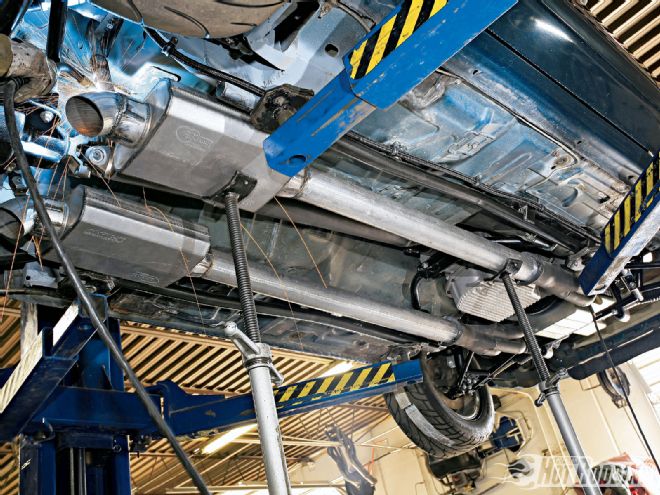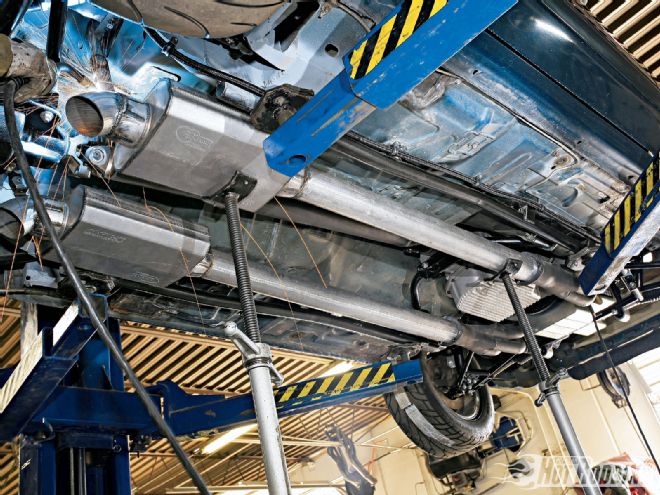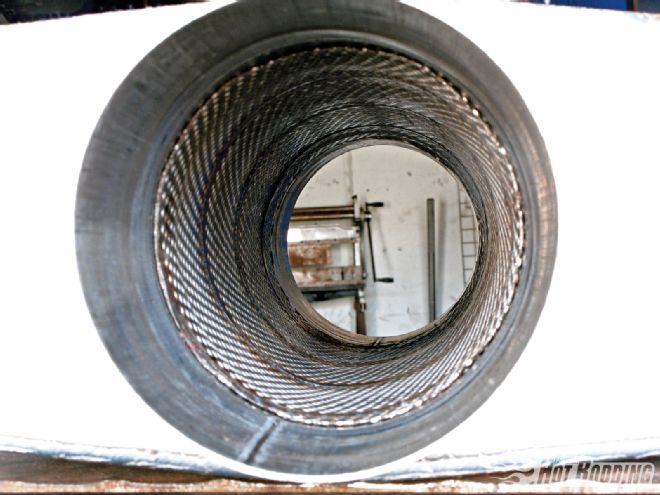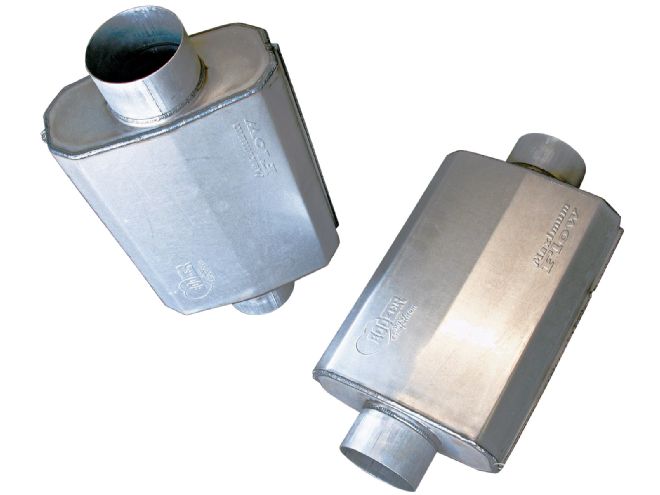
Any time you hang a fresh set of pipes beneath your floorboards, it's a very good day. Foreshadowing the burbly flow of cackling hydrocarbons that's about to ensue, it's a welcome sign that your project car is chugging down the home stretch toward completion. With the motor, trans, rearend, fuel system, suspension, rollcage, and cooling system already in place in our street/strip '93 Mustang project, we're itching to let it rip down the track. Since plans call for driving it 100 miles to the dragstrip and back, the auditory fury unleashed by its 532 ci and 273/280-at-.050 cam need to be tamed just enough to avoid unwanted attention. As with most engine swaps, however, routing fumes from the headers to the car's posterior isn't a mail-order affair. In the case of Project Fox, the situation is compounded by a rather large TH400 trans and beefy chromoly driveshaft that gobbles up lots of real estate in the trans tunnel, and a diminutive late-model chassis never intended to have massive dual 3.5-inch pipes crammed beneath it. Fortunately for us, the talented fabricators at Bill Buck Race Cars in Austin, Texas, were ready to take on the challenge.

The prevailing theme thus far with Project Fox has been keeping things simple and cheap, and designing a custom exhaust system was no exception. The setup we settled upon consists of 3 1/2-inch piping coming off of each header, and a pair of Hooker Maximum Flow straight-through mufflers dumping into turndowns positioned in front of the rearend. Much of the design was a product of necessity, as the space beneath the floorboards was further encroached by Project Fox's custom subframe connectors, heavy-duty drag sway bar, and the back bracing affixed to the rearend. Consequently, bends and kinks are virtually non-existent-which actually cut down on the installation time-and running the tailpipes over the rearend housing wasn't feasible. Compensating for the fact that a lack of over-axle pipes greatly increases the potential for annoying freeway resonance, we opted to run large oval mufflers instead of resonators. At the end of the day, the entire system was completed in about four hours, ringing up a tally of under $300.
 The Maximum Flow mufflers are as straight-through as it gets, with openings large enough to fit your arms in. The stainless steel perforated core resists heat and corrosion, while the ceramic wool insulation is designed to resist blowout.
The Maximum Flow mufflers are as straight-through as it gets, with openings large enough to fit your arms in. The stainless steel perforated core resists heat and corrosion, while the ceramic wool insulation is designed to resist blowout.
Muffler Design Mufflers reduce exhaust noise through the use of absorptive materials, such as fiberglass, or with noise deflection chambers. Each technique has its advantages and disadvantages. Absorptive mufflers convert sound waves into heat energy, typically flow slightly better than chambered designs, and are less prone to resonance. The drawback is that their ability to reduce noise is compromised as the packing material begins to burn out. To combat this, Hooker uses high-temperature-resistant ceramic wool insulation, and some manufacturers rely on stainless steel insulation. Chambered muffler designs, on the other hand, won't burn out, but are more likely to resonate. For the best of both worlds, some designs use both chambers and sound-absorbing insulation. -Stephen Kim
 Hooker offers both chambered- and absorption-style mufflers. For minimal resonance and uncompromised performance, we ordered a pair of Hooker's Maximum Flow absorption-style mufflers. They feature 16-gauge aluminized steel construction, and are available in 2 1/4-, 2 1/2-, 3-, and 4-inch inlet/outlet diameters. Although dual 4-inch pipes would probably work reasonably well with Project Fox's 532 cubes and 775 hp, we elected to run 3.5-inch tubing for improved ground clearance. Since the Maximum Flow mufflers aren't available in that diameter, we reduced a pair of 4-inch units down to 3 1/2 inches. At $68 per piece, they're a screaming deal.
Hooker offers both chambered- and absorption-style mufflers. For minimal resonance and uncompromised performance, we ordered a pair of Hooker's Maximum Flow absorption-style mufflers. They feature 16-gauge aluminized steel construction, and are available in 2 1/4-, 2 1/2-, 3-, and 4-inch inlet/outlet diameters. Although dual 4-inch pipes would probably work reasonably well with Project Fox's 532 cubes and 775 hp, we elected to run 3.5-inch tubing for improved ground clearance. Since the Maximum Flow mufflers aren't available in that diameter, we reduced a pair of 4-inch units down to 3 1/2 inches. At $68 per piece, they're a screaming deal.
Resonators
Lots of tough guys ditch their mufflers for resonators, only to bolt their mufflers back on after realizing that they aren't so tough after all. Technically speaking,
mufflers and resonators are both sound attenuation devices, so in that regard they're one in the same, however, resonators are marketed as round and compact devices while mufflers are perceived as being larger and more substantial. Other than size, the primary difference between the two is how much they reduce noise. Resonators typically quiet exhaust volume by 4-6 dB, while mufflers reduce noise by over 20 dB. Consequently, due to their small size and low mass, resonators are popular in racing classes where mufflers are mandatory. On the other hand, for street applications, resonators emit almost as much noise as having no mufflers at all. If space permits, resonators are very effective in reducing resonance when used in conjunction with mufflers. While resonators would've been much easier to fit beneath Project Fox, it was well worth the effort to make space for mufflers since Project Fox will definitely see some street time.
-Stephen Kim